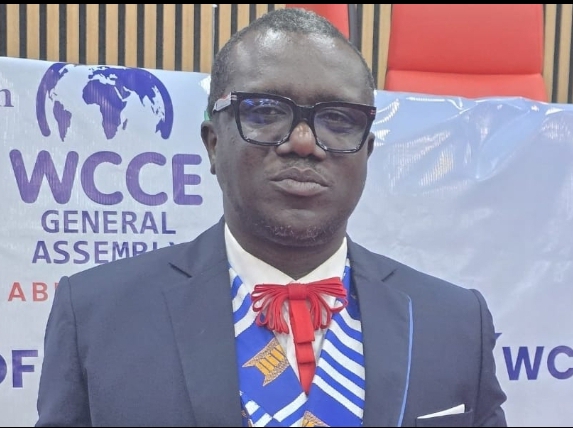News
NIHTE Deputy Nat’l Chairman tasks govt to invest in Digital Infrastructure

By Amos Musa
The Deputy National Chairman of the Nigerian Institution of Highway and Transportation Engineers (NIHTE) Bola Mudasiru has called on the government to invest in digital infrastructure to manage the transport system in the country
He made the disclosure while presenting a technical paper on the topic “Resilient Transportation Systems: Leveraging Technology for Sustainable Urban and Rural Mobility” at the 20th General Assembly World Civil Engineers held in Abuja recently.
Bola underscored the benefits of investing in digital infrastructures as it will eliminate roads traffic congestion thereby reducing accidents rates and gas emissions which is hazardous to human health.
He said “I recommend the government to invest in Digital Infrastructure by developing comprehensive digital platforms for transport management, including open data systems, real-time monitoring capabilities, and predictive analytics for proactive planning and maintenance.

“Develop Integrated Systems by creating seamless multimodal transport networks incorporating walking, cycling, public transport, and shared mobility options with unified planning, ticketing, and information systems.
“Embraced Climate Resilience
Integrate climate adaptation and sustainability criteria into design standards, procurement processes, and performance evaluation
frameworks for all transport investments.
“Enhance Stakeholder Collaboration to foster partnerships among government agencies, private sector entities, civil society organisations, and local communities to ensure transport solutions meet diverse needs effectively.
Prioritise Professional Development by Establishing continuous learning programmes for engineers, planners, and policymakers focusing on smart technology applications, sustainability principles, and resilience strategies.”
According to him the Global Infrastructure Disaster Costs
$280 billion annually from floods, landslides, wildfires, erosion, and structural collapses worldwide while Nigeria’s Infrastructure Vulnerability N2.3 trillion lost annually to flooding
and erosion affecting transport networks across 36 states.
While speaking on economic stability threats, the expert revealed that Africa suffers an average of $12.7 billion in annual infrastructure losses from natural disasters as quoted from Coalition for Disaster Resilient Infrastructure (CDRI).
In providing solutions to this gap, he explained that resilience means designing systems that anticipate, adapt and recover not merely respond to crises but stands the challenges .
“Our transport networks must be engineered to maintain functionality during extreme weather, geopolitical tensions, and unforeseen infrastructure failures.”
He pinpointed that the key barriers to resilience lies on Governance fragmentation where Transport responsibilities split across federal agencies with limited coordination mechanisms.
The NIHTE Deputy Chairman lamented that in terms of digital position only 3 cities in Nigeria have comprehensive transport data systems noting that the country confronted by traffic congestion, air pollution, and greenhouse gas emissions having severe impact on urban centers.
He suggested that that application of Intelligent Transportation Systems (ITS) will employ advanced information and Communication technologies (ICTs) to optimize transportation network performance, ensuring enhanced safety, efficiency, and traveler experience through Real-time data analytics, Sensor-based monitoring, Dynamic traffic management” Intelligent Transportation Systems (ITS) utilize advanced technology to optimize
traffic flow.
“It will provide Real-time data from roadside sensors, connected vehicles, and mobile devices is analyzed to Identify congestion and incidents, adjust signal timing- Reroute traffic, Provide drivers with up-to-the-minute information, This integrated approach enhances traffic efficiency, reduces congestion.
” It will ensure Electric mobility which represents the most cost-effective pathway to achieving these climate goals. Beyond environmental benefits, electrification will improve citizens’ quality of life by reducing transportation costs — particularly important given the removal of fuel subsidies .”
He stressed that Beyond traffic management, ITS also encompass a wide range of applications, including adaptive traffic signals, variable speed limits, electronic tolling, and multimodal traveler information systems.
“These technologies work together to create a more integrated, responsive, and user-centric transportation network, ultimately improving mobility, reducing emissions, and enhancing the overall quality of life.”
FG Making Taxation Fairer, More Beneficial to Ordinary Nigerians – Nweze https://dailyasset.ng/fg-making-taxation-fairer-more-beneficial-to-ordinary-nigerians-nweze/
Bola also bagged an award of Appreciation as Technical Paper Presenter for his well applauded and excellent presentation during the first General Assembly and conference of the World Council of Civil Engineers in Nigeria and Africa
















